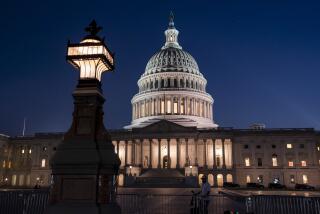Congress OKs Big Medicare Expansion Bill
- Share via
WASHINGTON — The Senate Wednesday gave final congressional approval to the largest expansion of the Medicare program since its inception, to be financed entirely by the 32 million elderly and disabled persons who will benefit from it.
The measure, which sailed through on a vote of 87 to 11 with strong bipartisan backing, has been approved by the House and now goes to President Reagan for his signature. No veto is expected.
Under the legislation, Medicare will begin paying part of the cost of prescription drugs, will provide unlimited periods of hospital care and will limit beneficiaries’ out-of-pocket expenses for doctor bills.
“With this vote, we will give the elderly in this country long overdue peace of mind,” Sen. John H. Chafee (R-R.I.) said.
Many senators spoke with emotion about ending older persons’ fears of losing their life’s savings during a medical catastrophe. The new protection is “the most far-reaching, sensible and compassionate extension of Medicare in the last 23 years,” said Sen. Dave Durenberger (R-Minn.), an early proponent of the bill.
However, opponents expressed concern about the greater tax burden the plan would place on elderly middle-income families.
“An awful lot of people are going to be disappointed,” Sen. Phil Gramm (R-Tex.) said before voting against the bill.
Starting next year, a Medicare patient will pay $564 for the first day of hospital care and then receive subsequent hospital care free. Currently, patients pay $130 daily for hospital care after their stay exceeds 60 days. The partial coverage for prescription drug charges--a new benefit--will begin in 1991.
Aid for the Neediest
In a major step to aid the nation’s neediest older persons, the bill requires that, by 1992, the states must pay all Medicare premiums and related expenses for elderly persons with incomes below the government-established poverty level, whether they are receiving welfare payments or not.
Another change requires the states to provide pre-natal care for all low-income pregnant women and health care for their infants, whether or not the mothers are receiving welfare benefits.
To pay for the expanded benefits, the plan raises the monthly Medicare premium by $4 from its present level of $24.80. In addition, the 40% of Medicare beneficiaries who have enough income to pay federal income taxes will be subject to a 15% tax surcharge, up to $800 a person. The surcharge will increase on a staggered scale through 1993.
The bill, known as the Medicare Catastrophic Coverage Act of 1988, originally was proposed by the Reagan Administration and then was hammered out by Congress to prevent the elderly and disabled from being driven into poverty by a catastrophic illness.
No Government Spending
Its most remarkable feature is the absence of any government spending for the $32.6 billion in estimated costs over the next five years.
“This is not going to cost the Treasury one dollar,” Sen. Lloyd Bentsen (D-Tex.), chairman of the Senate Finance Committee, asserted.
“For the first time in the history of the program, the financing of Medicare will not be solely on the backs of the workers in the form of a payroll tax or the beneficiaries in the form of a flat, across-the-board assessment,” Durenberger said.
The higher premium is expected to pay 37% of the added costs and the tax surcharge 63%.
Other highlights of the legislation:
--Doctor bills. A new ceiling, starting in 1990, limits a Medicare patient’s personal expenses to $1,370 a year. The current program pays a percentage of the costs but there is no ceiling on a patient’s payments.
Payments for Drugs
--Prescription drugs. Starting in 1991, after a patient has spent $600 in a year, the government will pay half of all additional expenses for prescriptions. In the next two years, the deductible will go up but the government’s share of additional costs also will rise, to a maximum of 80% in 1993.
--Home health care. The legislation covers seven-day-a-week care for at least 38 days.
--Skilled nursing care. The government-paid maximum is raised to 150 days from 100 and the existing requirement for a prior three-day stay in a hospital is eliminated. Patients would pay 20% of an average day’s cost for the first eight days of the care.
--Income protection. The bill gradually raises the amount of income a person may retain when his or her spouse goes into a nursing home. The limit will go to 150% of the federal poverty level by 1992.
More to Read
Get the L.A. Times Politics newsletter
Deeply reported insights into legislation, politics and policy from Sacramento, Washington and beyond. In your inbox twice per week.
You may occasionally receive promotional content from the Los Angeles Times.










